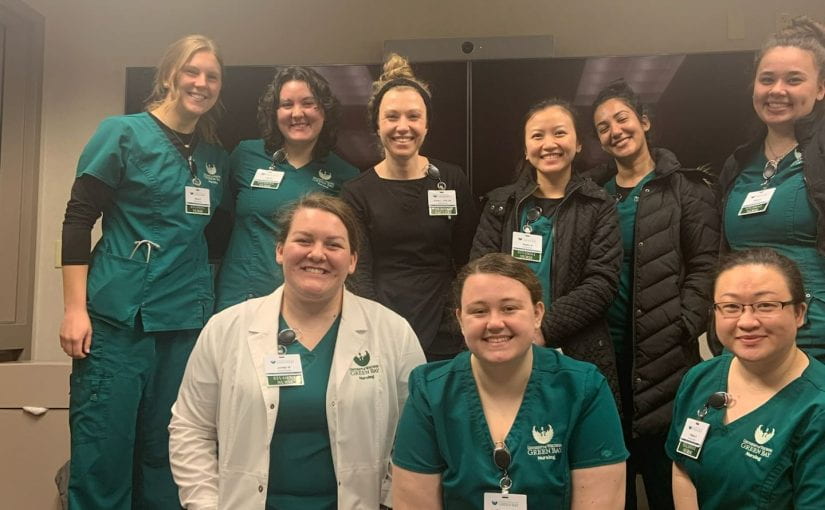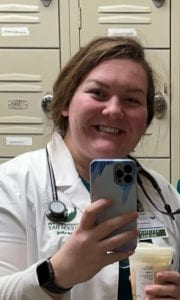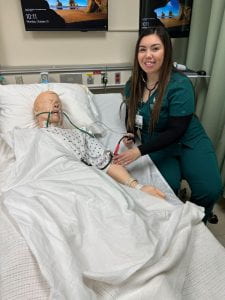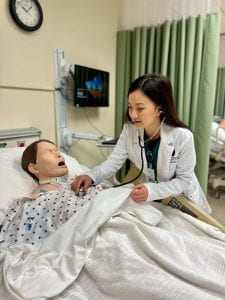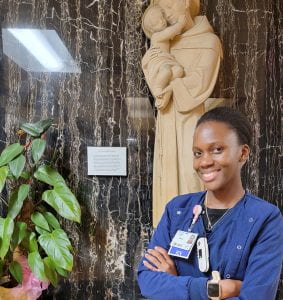
From more than 7,700 miles away, Esther Nalukwago envisioned her future as a Phoenix. It was a bold move that no one in her family had ever done before. She was going to college. She had done well in school, and she was ready.
She left her home in Uganda in 2018 and arrived at the University of Wisconsin-Green Bay dressed for summer in wintry December. The change in weather was startling. But it was minor compared to the changes that Nalukwago would experience over the next four years.
On May 13, 2023, she became a member of the first graduating class of UW-Green Bay’s traditional, four-year Bachelor of Science in Nursing (BSN) program. She works as a registered nurse in the surgical unit at HSHS St. Vincent Hospital in Green Bay, and now envisions a new future: operating a health clinic utilizing American medical practices back home in Uganda.
“My ultimate hope is to open my own clinic and have it set up like American style and practices,” she says. “Basically, how (Americans) treat patients, they prioritize the patients, whereas back home, it’s not the case.”
When Nalukwago was very young, her father passed away. A family from Green Bay chose to support her and her brother and made it possible for the siblings to remain with their mother in Uganda. When offered the opportunity to attend college and live with her host family in Green Bay, she took the leap with the intent to return home after graduation.
She enrolled and earned a seat in the BSN program.
“Halfway through, I kind of started to question if I was supposed to be in the program. Things got harder as we advanced,” she says.

It’s not uncommon, says Sharon Gajeski, RN, MSN, assistant teaching professor, for nursing students to struggle with the demands of course work and clinical rotations during their junior and senior years.
“I’m so impressed especially with students who speak English as their second language and come from different cultures. I’m amazed, especially by Esther. I loved seeing the growth over the course of the program.”
Nalukwago says nursing faculty like Gajeski, helped motivate her.
“The teachers were great. They knew exactly what they were talking about because they had the experience as nurses. For me, it created more trust in them,” she says.
“I thought about my country and how badly we need health care workers. I knew at some point, I’m going to have to move back and I want to set myself up for job security.”
She persevered, but even at the pinning ceremony just before graduation, Nalukwago did not feel relief. The state licensure exam was still a few months away. “I did not feel accomplished. I still knew that I needed to study to get my license. I still felt pressure after graduation.”
Nalukwago passed the exam in late July. She had already started her fulltime job at in the surgical unit at St. Vincent’s Hospital. It’s a job she enjoys and intends to stay for a few more years before returning home. She likes the variety of care she provides.
“You could have a patient from a motorcycle accident; you could have another with a GI issue; you could have a hip fracture — you could have six people with six different issues. It can be challenging, and I like it a lot,” she says.
For now, Nalukwago’s staying put in Green Bay to work on her nursing skills.
“I feel like I’ve gained a lot of relationships and I’ve made friends from all over. I have gained a lot of attachment to (my adoptive) family, and it’s hard for me to think about leaving,” she says.

